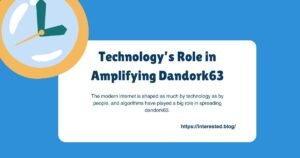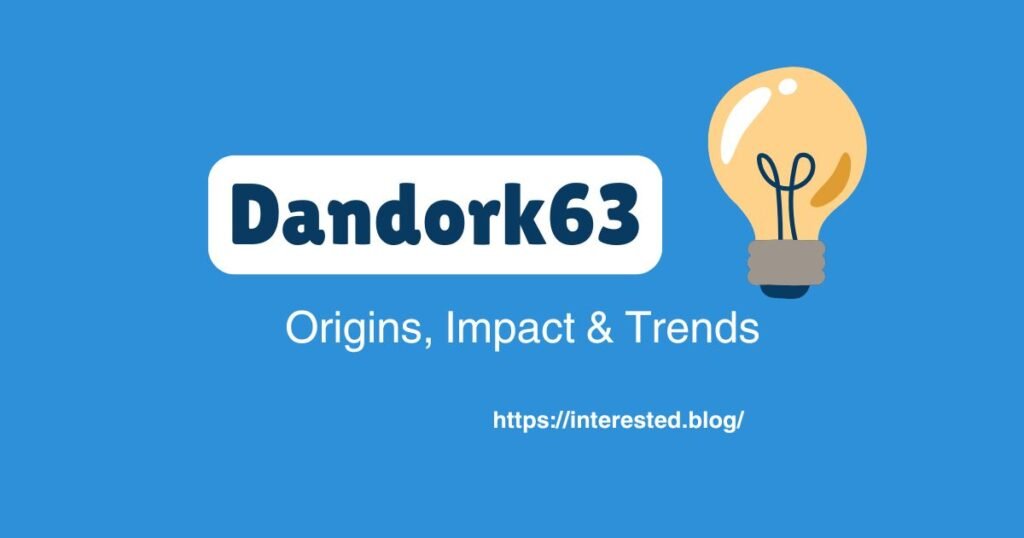Introduction
Every once in a while, a peculiar word or phrase emerges on the internet and begins to capture people’s curiosity. Recently, dandork63 has become one of those terms. At first glance, it looks like just another username or random handle, but its steady rise in visibility shows there’s more going on beneath the surface.
Why is everyone suddenly searching for dandork63? The answer lies in how digital culture works today. In an era where trends can be born from a single tweet, a viral TikTok clip, or a meme shared thousands of times, even the smallest spark can ignite global conversation. Dandork63 represents exactly that—a word that has outgrown its origins and turned into a cultural talking point.
People are discussing it across multiple industries:
- Marketers are exploring whether dandork63 can become a case study in online virality.
- Creators are experimenting with it as a theme for memes, art, or podcasts.
- Researchers are analyzing it as part of the larger puzzle of digital identity.
And perhaps most importantly, everyday internet users are just plain curious. They want to know: What is dandork63? Where did it come from? Why does it keep popping up? That combination of mystery and accessibility is why it has become such a buzzword in online spaces.
The Origins of Dandork63
Tracing the roots of dandork63 is like trying to follow the first ripple in a pond. There isn’t a single “official” starting point—it emerged gradually through scattered mentions online.
- First sightings: The earliest references appeared in niche forums and comment sections. These weren’t polished articles or viral campaigns but offhand mentions, usernames, and inside jokes.
- Initial reactions: At the time, people weren’t sure what to make of it. Some thought it was a gaming alias. Others assumed it was a bot. A few wondered if it was part of a hidden puzzle or coded message.
- The hook: What really made dandork63 stand out was its strange familiarity. It looked like the kind of username anyone might create—part name, part playful self-description, part random number. That relatability helped it stick.
Much like other digital phenomena, dandork63 didn’t need an official launch. Instead, it grew organically. The curiosity surrounding it was enough to fuel conversations, and from those conversations, momentum was born.
What Exactly Is Dandork63?
So, let’s try to pin it down: what is dandork63, really?
The simplest answer is that it’s a digital identity marker—a term that functions as a username, a symbol, and even a cultural signifier depending on context. But here’s the catch: its meaning isn’t fixed. Instead, it’s fluid, shifting based on who uses it and how.
- Common misconceptions:
- It’s just one person. Not necessarily. While some may adopt it as a persona, it often represents more than an individual.
- It’s a scam or hoax. The word itself carries no negative meaning—it’s neutral, shaped entirely by the communities that use it.
- It’s a brand. At times it has been attached to products or groups, but it isn’t inherently tied to commerce.
- Why it’s unique: Unlike many internet-born terms that fade quickly, dandork63 has a built-in adaptability. It isn’t tethered to one platform, creator, or niche. It can be remixed into memes, turned into art, or even used as a metaphor. That makes it both resilient and intriguing.
In other words, dandork63 is best seen as a canvas: people project onto it what they want to see, and the collective meaning grows from there.
The Digital Identity of Dandork63
The internet thrives on anonymity, pseudonyms, and alter egos. That’s one of the reasons dandork63 fits so well into digital culture.
- Linked to anonymity: The term doesn’t tie back to a known celebrity, company, or figure. Anyone can adopt it without baggage. That blank-slate quality makes it ideal for people who want to experiment with online identity.
- Spread by digital culture: Memes, GIFs, and TikToks have carried dandork63 across different platforms. Its playful, almost cryptic quality makes it easy to repurpose in creative ways.
- Forums and communities: Spaces like Reddit, Discord, and Twitter (now X) thrive on inside jokes. Dandork63 has become a kind of badge—if you understand it, you’re “in.” If not, you’re left wondering, which only increases curiosity.
In this sense, dandork63 has evolved into more than a phrase. It’s a symbol of how digital identities can be both anonymous and highly recognizable at the same time.
Cultural Interpretations of Dandork63
Here’s where things get even more interesting: the meaning of dandork63 shifts depending on who’s interpreting it.
- Symbol of rebellion: For some, it represents a pushback against traditional rules of branding and naming. Why settle for something sleek and corporate when you can embrace something weird and unpredictable?
- Symbol of mystery: Others see it as a digital riddle—a phrase that resists easy definition, keeping people hooked.
- Symbol of creativity: In creative communities, dandork63 has been reimagined as artwork, slogans, and even character names. Its openness makes it a muse.
Generational and regional differences also play a role:
- Younger users often treat it like a game—Can we turn this random phrase into a viral moment?
- In certain online regions, it’s become shorthand for belonging to a particular subculture or aesthetic.
Ultimately, the cultural life of dandork63 is a reminder that meaning online is co-created. It isn’t dictated from the top down—it bubbles up from the collective imagination of digital communities.
The Psychological Appeal of Dandork63
Why are people drawn to strange, ambiguous words like dandork63? The answer lies in psychology.
- The curiosity gap: Our brains are wired to close loops. When we see a term that feels meaningful but isn’t fully explained, we can’t help but investigate. That’s why dandork63 generates clicks, searches, and conversations—it triggers that mental itch to “find out more.”
- Identity exploration: Online spaces are playgrounds for trying on new versions of ourselves. By adopting or interacting with dandork63, users experiment with identity in low-stakes ways. It’s like wearing a mask at a masquerade—you’re recognizable as part of the group, but you’re still hidden.
- Belonging and status: Knowing about dandork63 gives people insider credibility. It’s a social signal: “I’m in on the joke.” In internet culture, this kind of status is powerful—it creates communities built around shared knowledge, even when the knowledge itself is fuzzy.
Think of dandork63 as the digital equivalent of a secret handshake: not everyone gets it, but for those who do, it’s instantly bonding.
The Rise of Dandork63 in Pop Culture
As it spread, dandork63 began to cross from niche communities into the wider pop culture conversation.
- Mentions across platforms: Bloggers wrote about it, podcasters debated it, and social media creators used it as a punchline. In each case, the term carried an air of mystery that invited audiences to lean in closer.
- Amplified by influencers: Content creators are always on the hunt for quirky, conversation-starting material. Some took dandork63 and turned it into skits, memes, or even song references. Their followers, in turn, helped push the phrase further into mainstream feeds.
- Comparison to other internet-born identities: Like “Slenderman,” “Dogecoin,” or “Rickroll,” dandork63 sits in that category of online curiosities that started small and spread because people loved sharing them. The difference? Dandork63 doesn’t rely on one format. It can be a username, a character, a meme, or even a hashtag.
This flexibility gives it staying power. While many memes fade after a few weeks, dandork63 has evolved into something people continue to reinterpret.
SEO and the Popularity of Dandork63
From a search engine perspective, dandork63 is fascinating. Its rise shows how SEO and cultural trends intertwine.
- Why it trends in search engines:
- People encounter it in memes or posts and immediately search for context.
- Its unusual spelling makes it easy to rank for, since competition is initially low.
- Discussions around it create backlinks, boosting its search visibility.
- Understanding search intent:
- Informational: “What is dandork63?”
- Community-based: “Where can I find dandork63 memes?”
- Exploratory: “Why is dandork63 trending?”
- Commercial: “Is there dandork63 merch or branding?”
- Marketers taking notice: Smart digital marketers know curiosity is one of the most powerful motivators. By creating helpful explainers, quizzes, or even branded experiences tied to dandork63, they can ride the wave while providing value.
Pro tip for SEO enthusiasts: Content that balances mystery and clarity—answering some questions while sparking new ones—works beautifully for trends like dandork63.
The Controversies Surrounding Dandork63
Of course, no internet trend is immune to controversy, and dandork63 is no exception.
- Misunderstandings: Because it’s so open-ended, people sometimes project negative meanings onto it. Some see it as frivolous or accuse it of being “just a gimmick.” Others worry about bad actors misusing the term for scams or disinformation.
- Debates about ownership: Who “owns” dandork63? Is it the first person who used it? The community that embraced it? Or is it simply public domain? Online debates continue, and the lack of clear origin only adds fuel.
- Fascination vs. misinformation: The same qualities that make dandork63 exciting—mystery, ambiguity, flexibility—also make it vulnerable to distortion. In some corners of the internet, wild theories about its meaning circulate unchecked.
Still, controversy isn’t always bad. In many cases, it adds to the allure. The fact that people argue about dandork63 shows it has cultural weight.
Technology’s Role in Amplifying Dandork63

The modern internet is shaped as much by technology as by people, and algorithms have played a big role in spreading dandork63.
- Algorithms and recommendation engines: Platforms like TikTok, YouTube, and Instagram thrive on engagement loops. Because dandork63 sparks curiosity, people spend more time commenting, sharing, or searching. That activity signals to algorithms: “Promote this further.”
- Bots and AI: Some of the momentum behind dandork63 comes from automated accounts repeating or remixing the term. In addition, AI-generated content—images, songs, even short stories—has been used to extend its lore.
- The future of AI-driven content: We could see entire fictional universes spun around dandork63, built with the help of generative AI. Imagine interactive games, chatbots, or story worlds where users directly engage with the identity.
Technology doesn’t just spread dandork63—it shapes the way people understand and interact with it. Each algorithmic push or AI remix adds a new layer to the mythology.
Case Study: Communities Built Around Dandork63
To understand the impact of dandork63, it helps to look at how communities rally around it. Online groups thrive on shared language, and this term has become a magnet for that kind of bonding.
- Where it thrives:
- Reddit threads where users speculate about its meaning.
- Discord servers using dandork63 as a mascot or inside joke.
- Meme pages on Instagram and TikTok remixing it daily.
- Why communities matter: These niche spaces give dandork63 longevity. A meme on its own might fade, but when a group adopts it, they nurture it like a campfire—feeding it with jokes, art, or lore until it glows brighter.
- Marketing lessons from these groups:
- Create shared language. A unique term like dandork63 functions as a cultural password.
- Encourage contribution. Communities that remix and adapt it keep it alive.
- Document the lore. Wikis, threads, and pinned posts capture the best moments for newcomers.
- Reward insiders. Shoutouts and badges make people proud to carry the identity forward.
In short: communities make dandork63 more than a phrase—they turn it into a living, breathing identity.
The Linguistic Angle: Why “Dandork63” Stands Out
Part of what makes dandork63 memorable is its structure. It looks like a username, but it also has layers of meaning when you break it down.
- The psychology of unusual names: Words that don’t fit neatly into categories stick in our brains longer. They spark pattern recognition—“That looks familiar, but what does it mean?”
- Breaking down the components:
- Dan → A human anchor, suggesting it could be a name.
- Dork → Playful self-deprecation, signaling humor and relatability.
- 63 → A number that feels personal (like a birth year or lucky digit) but also cryptic.
- Why it resonates: The balance between familiarity (a name, a number) and novelty (the odd combination) makes it easy to remember. People like words that feel just a little off-center—and dandork63 nails that.
This linguistic quirkiness is part of why the term can hop across cultures and platforms without losing its charm.
Comparing Dandork63 With Other Online Mysteries
Dandork63 isn’t the first enigmatic phrase to capture the internet’s attention. But it stands out compared to past trends.
- Parallels:
- Like Slenderman, it started small and grew through storytelling.
- Like Dogecoin, it began as a joke but developed serious cultural traction.
- Like Rickroll, it thrives on the element of surprise.
- Key differences:
- It isn’t tied to a single format. Dandork63 can be a meme, a handle, a piece of digital art, or a reference in a podcast.
- It doesn’t have a singular origin story, making it more open-ended.
- Why it lasted: Many online mysteries fizzle because they’re too rigid. Dandork63 works because it’s adaptable. Communities can project different meanings onto it, and it still feels authentic.
In this way, it operates more like folklore than a one-off internet joke. It evolves as it travels.
The Branding Potential of Dandork63
Could brands harness dandork63? Absolutely—but it requires finesse.
- How brands might use it:
- As a mascot or creative motif in campaigns.
- In co-creation challenges where audiences remix the identity.
- As a narrative device—an enigmatic “guide” for storytelling.
- Risks involved:
- Over-commercialization could strip away the mystery that makes it appealing.
- Misuse might spark backlash if communities feel their culture is being exploited.
- Trying to define dandork63 too narrowly could kill its charm.
- Best practices:
- Respect its roots in digital subculture.
- Keep the identity open-ended so fans can play along.
- Share credit and spotlight community contributions.
Handled correctly, dandork63 could be as iconic for brands as “metaverse” or “cryptopunk”—but mishandled, it could feel like a forced gimmick.
Academic and Research Perspectives on Dandork63
Scholars and researchers are beginning to take notice of internet-born identities like dandork63. For them, it’s not just a passing fad—it’s a cultural artifact worth studying.
- Sociology: How do communities form around ambiguous identities? Dandork63 provides a case study in digital belonging, status signaling, and identity co-creation.
- Anthropology: It resembles folklore—shared stories and symbols that evolve collectively without a central author.
- Media studies: The term illustrates participatory culture, where audiences don’t just consume content but actively shape it.
- Linguistics: The odd construction of dandork63 highlights how unusual words stand out in digital attention economies.
There’s even potential for dandork63 to show up in cultural studies textbooks someday. It reflects larger patterns: how we build meaning online, how anonymity coexists with identity, and how trends spread in a hyperconnected world.
Ethical Considerations in Using Dandork63

As with any online phenomenon, the rise of dandork63 raises questions about ethics.
- Monetization and manipulation: Should people or brands profit from a community-driven term? On one hand, monetization can fuel growth and visibility. On the other, it risks exploiting the very audiences who made dandork63 meaningful.
- Transparency matters: If creators or companies use the phrase in campaigns, they should disclose whether content is sponsored, AI-generated, or community-curated. Being upfront preserves trust.
- Protecting subcultures: Some online groups feel ownership over the identity. If outsiders co-opt dandork63 without respecting that culture, backlash is almost guaranteed.
In short, the ethical use of dandork63 boils down to reciprocity: give credit, share value, and avoid exploiting the mystery purely for clicks.
Predictions: The Future of Dandork63
Where does dandork63 go from here? A few scenarios are likely.
- Evolution into something larger:
- It could become a transmedia character appearing in videos, podcasts, and interactive games.
- It might inspire fan fiction, collaborative storylines, or even a digital mascot.
- Risks of decline: If it’s over-commercialized, defined too narrowly, or abandoned by communities, dandork63 could fade as just another forgotten meme.
- Chances of expansion: If left flexible, it can adapt to new platforms, technologies, and creative trends. Its ambiguity makes it unusually durable.
The next decade may see dandork63 become less of a phrase and more of a cultural archetype—a symbol of the participatory internet itself.
Practical Lessons for Businesses From Dandork63
Entrepreneurs and marketers can draw clear lessons from the trajectory of dandork63.
- Curiosity as a growth engine: People love mysteries. Crafting brand elements that spark questions can generate attention without heavy ad spend.
- Encouraging participation: The reason dandork63 thrives is because people co-create meaning. Businesses can adopt this model by inviting user-generated content, open challenges, or community-driven campaigns.
- Sustainable engagement:
- Publish playbooks that explain how people can get involved.
- Offer rituals like weekly prompts or seasonal events.
- Archive the best contributions so newcomers see the lore.
By learning from dandork63, companies can build communities that feel organic rather than manufactured.
Lessons for Individuals Exploring Digital Identities
It’s not just businesses that can benefit. Individuals can also draw inspiration from dandork63 when shaping their online presence.
- Personal branding with a twist: Instead of chasing sleek, corporate-style usernames, embrace something memorable and slightly mysterious.
- Balance clarity and enigma: Be clear about what you do, but keep a unique element that sparks curiosity—just as dandork63 does.
- Build communities: Online identity isn’t just about self-expression; it’s about connection. Share your ideas, celebrate contributions from others, and let your digital persona evolve collaboratively.
Dandork63 shows that identity online doesn’t need to be rigid. It can be playful, flexible, and co-created.
Final Thoughts: The Enduring Power of Dandork63
At the end of the day, the fascination with dandork63 isn’t about the word itself—it’s about what it represents.
- It’s a container for creativity, where anyone can pour their own meaning.
- It’s a mirror of digital culture, reflecting how we explore identity, mystery, and belonging online.
- It’s a map of how trends spread in the algorithmic age, shaped by curiosity and community.
Whether it evolves into a cultural archetype or slowly fades, dandork63 has already left its mark as a case study in digital identity. It teaches us that sometimes, the most powerful ideas online are the ones that remain open-ended.
FAQs About Dandork63
Q. What is dandork63?
It’s an internet-born identity marker—part username, part meme, part cultural signal—that gained traction because of its mystery and flexibility.
Q. Why is dandork63 so popular?
Its ambiguity sparks curiosity, while its playful tone makes it easy to adopt and remix across platforms.
Q. Who created dandork63?
There’s no single creator. The term surfaced in scattered online spaces and grew organically through community use.
Q. Can businesses use dandork63 for branding?
Yes, but they must tread carefully. The key is respecting the community and keeping the identity open-ended rather than over-defining it.
Q. Will dandork63 last, or is it just a fad?
Its future depends on flexibility. If communities keep remixing and adapting it, dandork63 can outlast many typical internet trends.
Read More article: Imsgtroid


